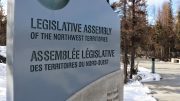MP Michael McLeod announced a handful of clean technology projects in the territory that will be getting federal funding.
The total dollar amount is $3.8 million dollars for six projects in the NWT.
The largest portion, $2 million, is going to the University of British Columbia to develop carbon sequestration technology for mining.
Greg Dipple is the project lead and at the announcement yesterday – he said the team is doing a pilot project at Gahcho Kué mine to test the technology this week.
The technology would be applicable to mines that drill through substances like kimberlite (like diamond and nickel mines); if successful, Dipple said, newer facilities designed with this technology could even become carbon neutral.
The Centre for Indigenous Environmnetal Resources will get $380,000 for a set of workshops dedicated to improving energy knowledge for Indigenous women and youth.
Former Thebacha MLA Michael Miltenberger is among those involved in the project and he says the centre is working with communities to find people interested in knowing more about developing clean energy and will put on three workshops in the coming weeks.
The Denesoline Corporation of Lutsel k’e Dene First Nation will receive $400,000 to finish a study on a green energy center that would include a mix of solar, hydro and wind.
For now, researchers are still assessing the feasibility of such a centre.
Haroon Bhatti, innovation manager with Denesoline Corp., said artificial intelligence would dictate what type of energy would be prioritized day-to-day. The goal is to develop one megawatt of power generation through the centre, and allow Lutsel k’e to expand.
The Hamlet of Aklavik will receive $840,000 to install a biomass heating system to power the community and energy efficiency upgrades.
Finally, the Rat River Development Corporation will get $229,000 for a feasibility study on adding a biomass boiler to the community’s power system.
Francis was a reporter with CKLB from January 2019 to March 2023. In his time with CKLB, he had the immense pleasure and honour of learning about northern Indigenous cultures.









